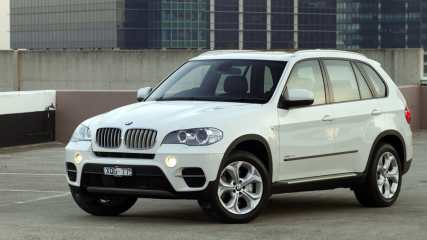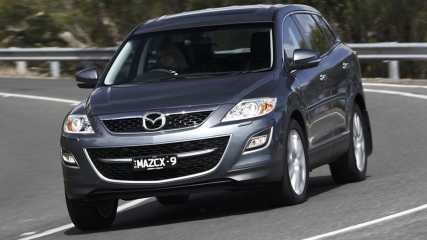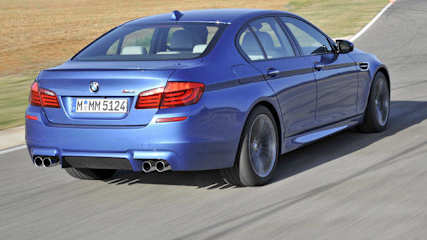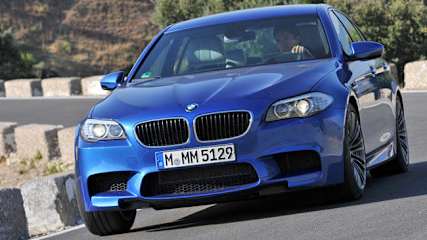BMW X5 2008 News

BMW, Mazda, FCA, Citroen and Peugeot models recalled
Read the article
By Robbie Wallis · 14 Sep 2017
Manufacturers including BMW, Fiat Chrysler Automobiles (FCA), Peugeot and Citroen have issued recalls via the Australian Competition and Consumer Commission (ACCC).

Mazda, BMW affected again by Takata recalls
Read the article
By Justin Hilliard · 03 Aug 2017
The Australian Competition and Consumer Commission (ACCC) has announced another round of safety recalls, with models from Mazda, Holden, Mercedes-Benz, BMW and Jaguar affected.

BMW M5 may go AWD
Read the article
By Paul Gover · 13 Oct 2011
The twin-turbo V8 in the muscular new mid-sizer is stretching the friendship with the back tyres in the fifth-generation M5 and there are concerns about customer reaction in snow-belt countries around the world. An all-wheel drive upgrade is the logical solution and BMW M chiefs from Munich admit they are considering the move.
"We are thinking about it," says Max Ahme, M5 project leader. "If you are increasing the power more and more, maybe you need it."
The basic powerplant in the M5 is the same 4.4-litre twin-turbo V8 already used in the M versions of BMW's full-sized SUVs, the X5 and X6, but is tweaked to unleash 412 kiloWatts of power and 680 Newton-metres of torque.
"The block is the same, but the cylinder heads are new. The inlet track is new, it has double Vanos (variable valve timing) and more revs. So, more power," says Ahme.
He refuses to go into much detail but it's clear that BMW M is making a serious assessment of its first all-wheel drive passenger car. "It's a good idea, but it would add 120 kilograms to the car and it's all over the front axle," says Ahme.
Other companies have made all-wheel drive conversions successful, including Ferrari with the lightweight system fitted to its new FF supercar.
Ahme admits BMW has had an FF in its workshop, although he believes the system would not be suitable for an M5. "We have looked at this car. We do some swaps with Ferrari." But Ahme is totally black-on-white on one potential stretch of the M5, into a new Touring wagon. "This will not happen," he says.
There have been three M5 Touring models in the past but the sales record of the car is not good, and numbers dropped dramatically in the previous-generation car. "It does not make any sense. Just look at the numbers," says Ahme.

BMW drops entry price for 5 Series
Read the article
By Paul Gover · 13 Oct 2011
The upcoming 520i, priced from $77,900 instead of the previous $82,000 for a 520d, comes after an earlier move on the 3 Series down under. BMW Australia says its objective is to provide better value, as well as a 'stepped' approach to equipment levels that mirrors bottom-end brands from Hyundai and Kia to Holden and Ford.
It began the change with the 3 Series and is now moving on the Five with a claim of up to $7000 worth of extra value - most of it in standard equipment - on the 520i.
There is also said to be more punch from the engine, which is a new 2.0-litre four with TwinPower turbo good for 135 kiloWatts and 270 Newton-metres of torque.
"We've got power up, value up and fuel consumption down. Everyone is happy," says BMW spokesman, Piers Scott. A new four-cylinder 528i - replacing the previous six-pack - is also part of the 5 Series change, with more equipment in the 535i and 535d that means up to $7000 of extra value.
Scott says the value boost comes thanks to the engine change but does not deny BMW's stronger emphasis on value at a time when it is taking a battering from Mercedes-Benz and Audi on both sides.
"It's really just the fact that this is a brand-new engine that's available to us. That accounts for the 520 and the 528i," he says.
"The other changes are to get a logical ladder into the price structure. "The jump from the 520i - which snuggles under the Luxury Car Tax threshold thanks to economy of 6.4 litres/100km and CO2 emissions of 149 grams/kilometre - to the 528i manes 180 kiloWatts and 350 Newton- metres, even though the four-cylinder basics are the same. The 528i is priced from $98,200, helped by also qualifying as a low-emission model under the LCT rules.
Prices of the 535i and 535d now start at $115,600 and $120,900 respectively, with the diesel engine now boasting 230 kiloWatts and an eight per cent economy boost, with the 535i also getting a 0.7 litres/100km economy improvement.
BMW Australia now also includes stop-start technology on all Fives except the 550i, with its new Active Safety package - closing the windows and sunroof, electro-mechanical belt tensioning and a crash- optimised position for the passenger-seat backrest - also part of the deal.

BMW acts to narrow options
Read the article
By Paul Gover · 14 May 2008
The explosive growth of the BMW model range is about to be defused in Australia, with the line-up being trimmed to cut competition and duplication, making it easier for customers in showrooms.The plan is to have only three choices of any individual model, with two petrol engines and one diesel.The current list includes 36 individual models in the 3 Series sedan line-up ... without counting the coupe, convertible or station wagon.“We get a lot of questions about whetherwe have too many models,” BMW Australia managing director Guenther Seemann says.“I think we do have too many.”He believes BMW must cut the choices to streamline business, though he says there will still be all-new models in future — with the X6 four-wheel-drive and M3 sedan up next — asthe German company looks for customers.The work has begun, though there are a dozen individual BMW lines, from the baby 1 Series to the four-wheel-drive X5 and flagship 7 Series, with 50 official engine choices. BMW has 189 individual models on the list.“We've already begun tidying up. The 116i hatch has been removed from the range, there are the manuals in the 3 Series and one of the X3 manuals,” Seemann says.“In the 5 Series range, one of the V8s will go.I believe for each and every model line-up in the future, as we add models, we need two petrol and one diesel variant in each case. No more. We have so many different model lines, it is not practical or possible to display them all in a showroom.”He says it will take time to get things sorted, partly because there are so many models.“It will happen in the next two years. Globally, there are five petrol and five diesel engine choices. And that is just in the 3 Series range,” Seemann says. But there is definitely space for some additions, like the four-door M3 sedan.“We will bring the four-door version, but I do not know at what price. We have to price it lower than the M3 two-door.”

BMW line-up sliced
Read the article
By Paul Gover · 09 May 2008
The explosive growth of the BMW model range is about to be defused in Australia. The line-up is being trimmed to cut competition and duplication, making it easier for customers in showrooms.The plan is to have only three choices of any individual model, with two petrol engines and one diesel. The current list includes 36 individual models in the 3 Series sedan line-up . . . without counting the coupe, convertible or station wagon.“We get a lot of questions about whether we have too many models. I think we do have too many,” BMW Australia managing director Guenther Seemann says.He believes BMW must cut the choices to streamline business, though he says there will still be all-new models in future — with the X6 four-wheel drive and M3 sedan up next — as the German company looks for customers.The work has begun, though there are a dozen individual BMW lines, from the baby 1 Series to the four-wheel-drive X5 and flagship 7-Series, with 50 official engine choices. BMW has 189 individual models on the list.“We've already begun tidying up. The 116i hatch has been removed from the range, there are the manuals in the 3 Series and one of the X3 manuals,” Seeman says.“In the 5 Series range, one of the V8s will go. I believe for each and every model line-up in the future, as we add models, we need two petrol and one diesel variant in each case. No more. We have so many different model lines, it is not practical or possible to display them all in a showroom.He says it will take time to get things sorted, partly because there are so many models.“It will happen in the next two years. Globally, there are five petrol and five diesel engine choices. And that is just in the 3 Series range,” he says.But there is definitely space for some additions, like the four-door M3 sedan.“We are starting the business case. It looks good, I must say,” he says.“We will bring the four-door version, but I do not know at what price. We always follow the normal BMW pattern, where a two-door is more expensive than a four-door. We have to price it lower than the M3 two-door.”

BMW rolls diesel and hybrid in one
Read the article
By Chris Riley · 19 Mar 2008
BMW has combined its diesel expertise with innovative Active Hybrid technology in a concept car that could go into production sooner rather than later.Based on a BMW X5, the concept car demonstrates the potential of technology developed as part of the BMW Efficient Dynamics program.Boasting the worlds first all-aluminium diesel with a specific power output of over 65kW per litre of capacity and a generator as part of a mild hybrid concept, the vehicle uses a frugal 6.5-litres of fuel per 100km and emits 172g of carbon dioxide per kilometre.It has sporty driving dynamics and will accelerate from 0-100km/h in 8.9 seconds.The engine features a 2.0-litre four-cylinder diesel engine with variable twin turbo, latest generation common rail injection and all-aluminium gearbox housing.It develops 150kW/400Nm.A compact generator, integrated in the gearbox housing, contributes to vehicle acceleration with 15kW and a maximum torque of 210Nm. The total output of the vehicle is 165kW.

BMW all for diesel
Read the article
By Stephen Ottley · 22 Feb 2008
Australia should have a diesel future within six years.BMW Australia boss Guenther Seemann believes the local car industry will follow Europe and become 80 per cent diesel, but only if Holden and Ford produce oil-burning Commodores and Falcons.“If I were CEO of these companies I would develop a diesel V8,” Seemann says.His comments come after BMW's own sales of diesels hit 33.1 per cent in January as the brand expands its diesel line-up.Seemann believes diesel will continue to grow because “there is no way down for petrol prices." The other factor in diesel growth, he says, is the advances in performance.BMW has entered the high-performance, four-wheel-drive fray with its new X5 3.0sd, a twin-turbo version of its six-cylinder diesel.It is aimed at taking on the sports-orientated diesel four-wheel-drives, including the Audi Q7 V8 TDI, Volkswagen Touareg V10 TDI and Range Rover V8 Turbo Diesel.Though BMW reps concede the new model will take some sales from its current X5 3.0d, they are adamant the new car is crucial to the growth of the X5 and BMW's diesel future.“X5 business is very important to us,” the product and market planning manager for BMW Australia, David Lederer, says.“There's potential to grow that business by having a diesel that can get additional incremental sales.”He says thanks to the fuel efficiency of the diesels now being matched by performance, customers no longer see them as a compromise.“That's what our figures are showing. Diesel offerings are so good in terms of torque that I don't think people are buying them just because of efficiency. I think people are responding to the torque and dynamism.”On the road, the new X5 3.0sd is as expected. The strong chassis still stands out and the new engine provides even more of a chance to exploit it.BMW's solid reputation for building superb powerplants remains intact. The X5 is smooth and has plenty of torque to get the two-tonne four-wheel-drive up to speed.With 565Nm on tap from 2000 revs, the X5 isn't sluggish to accelerate, but it does lack some of the punch of the Touareg with its 750Nm.BMW's claimed consumption figure of 8.8 litres for 100km in combined city/country driving was optimistic during our test drive. Over the course of four hours of spirited driving on country roads, we averaged 11.7 litres for 100km.Given that this is another addition to the X5 range, BMW has kept the model line-up simple with only two variants; a standard 3.0sd and the option of a sports package.Prices for the entry-level 3.0sd start at $102,800 and the sports package begins at $107,300.

Go diesel or go bust
Read the article
By Stephen Ottley · 15 Feb 2008
Australia should have a diesel future within six years.BMW Australia boss Guenther Seemann believes the local car industry will follow Europe and become 80 per cent diesel, but only if Holden and Ford produce oil-burning Commodores and Falcons.“If I were CEO of these companies I would develop a diesel V8,” Seemann says.His comments come after BMW's own sales of diesels hit 33.1 per cent in January as the brand expands its diesel line-up.Seemann believes diesel will continue to grow because “there is no way down for petrol prices”. The other factor in diesel growth, he says, is the advances in performance.BMW has entered the high-performance, four-wheel-drive fray with its new X5 3.0sd, a twin-turbo version of its six-cylinder diesel.It is aimed at taking on the sports-orientated diesel four-wheel-drives, including the Audi Q7 V8 TDI, Volkswagen Touareg V10 TDI and Range Rover V8 Turbo Diesel.Though BMW reps concede the new model will take some sales from its current X5 3.0d, they are adamant the new car is crucial to the growth of the X5 and BMW's diesel future.“X5 business is very important to us,” the product and market planning manager for BMW Australia, David Lederer, says.“There's potential to grow that business by having a diesel that can get additional incremental sales.”He says thanks to the fuel efficiency of the diesels now being matched by performance, customers no longer see them as a compromise.“That's what our figures are showing. Diesel offerings are so good in terms of torque that I don't think people are buying them just because of efficiency. I think people are responding to the torque and dynamism.”On the road, the new X5 3.0sd is as expected. The strong chassis still stands out and the new engine provides even more of a chance to exploit it.BMW's solid reputation for building superb powerplants remains intact. The X5 is smooth and has plenty of torque to get the two-tonne four-wheel-drive up to speed.With 565Nm on tap from 2000 revs, the X5 isn't sluggish to accelerate, but it does lack some of the punch of the Touareg with its 750Nm.BMW's claimed consumption figure of 8.8 litres for 100km in combined city/country driving was optimistic during our test drive. Over the course of four hours of spirited driving on country roads, we averaged 11.7 litres for 100km.Given that this is another addition to the X5 range, BMW has kept the model line-up simple with only two variants; a standard 3.0sd and the option of a sports package.Prices for the entry-level 3.0sd start at $102,800 and the sports package begins at $107,300.

Discovery 3 wins three in a row
Read the article
By Stuart Innes · 09 Jan 2008
Land Rover Discovery 3 diesel for the serious four-wheel-driver, BMW X5 diesel for the luxury 4WD buyer and Nissan X-Trail for the recreational 4WD motorist.They are the winners of the three 4WD categories in Australia's Best Cars awards, decided by state motoring organisations, including the RAA.The judges consider safety, price, running costs, comfort, performance, security and retained value. Design, function and on-road ability - and in the case of 4WDs, offroad ability - also are scored.The awards have 12 categories, with three finalists short-listed for each category. Three of the categories are for 4WD vehicles.The Recreational 4WD category was won by the newly-updated Nissan X-Trail 2.5-litre four-cylinder. The ST version with CVT automatic transmission, priced at $33,990, came in ahead of Honda CR-V and Toyota Kluger.“Off-road, the new X-Trail shows why it is rated at the front of the recreational 4WD pack,” says the judging panel. “Nissan's intelligent All Mode 4x4 system is controlled by the twist of a centre console knob, which allows the driver to choose between front-wheel drive and fully automatic four-wheel drive.“A centre differential lock is also provided for improved off-road performance. Two new worthwhile standard features are a hill-descent control and a hill-start assist.”The Luxury 4WD award was won by BMW X5 three-litre diesel with a six-speed automatic. Priced at $86,800, it beat the Lexus RX350 (which won in 2006) and the Lexus RX400h hybrid version.Judges noted the Lexus beat the BMW in standard features, and that BMW charges heavily for options. Yet the BMW scored consistently high in all areas, coming tops in braking, handling, security and trebling the Lexus score in 4WD ability. “It's a moot point as to how much off-road work the X5 will do. But when called upon, it can deliver in spades,” say the judges. “Like many diesel engines, the three-litre oil-burner is powerful (160kW), flexible and frugal (potentially under 9 litres/100km) and puts out a tree-stump-pulling 500Nm of torque at 1750rpm.”The All-terrain is the category for more serious 4WDs, this time won by the Land Rover Discovery 3SE with the 2.7-litre V6 diesel and six-speed automatic. Priced at $74,990 it beat Mitsubishi Pajero VRX diesel and Toyota Prado GXL diesel, which each cost less.Judges say “prospective buyers can rest assured that once comfortable with the dollars, they will have one of the best-engineered 4WD vehicles on the market. At full suspension height, the approach and departure angles, as well as the overall ground clearance, will handle the worst bush tracks, while the degree of selectable suspension control means it does not dance around at higher speeds on corrugated roads.”Australia's Best Cars judges say buyers do not have to compromise between off-road capability and on-road comfort and performance.





